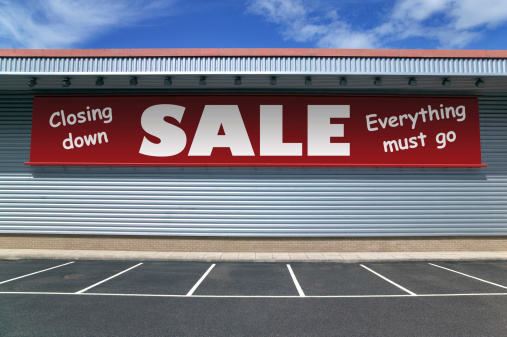We all know that retailers like J.C. Penney Co. Inc. (NYSE: JCP) and RadioShack Inc. (NYSE: RSH) are in deep trouble.
But quarterly results for four other big retailers — Abercrombie & Fitch Inc. (NYSE: ANF), Bed Bath & Beyond Inc. (NASDAQ: BBBY), Family Dollar Stores Inc. (NYSE: FDO) and Staples Inc. (NASDAQ: SPLS) — suggest they, too, face increasingly difficult business environments.
They may not be close to collapse, but shares for all four are at or near their 52-week lows. They are struggling because of competitive pressures from the likes of Amazon.com Inc. (NASDAQ: AMZN) and Wal-Mart Stores Inc. (NYSE: WMT), or their managements have made bad decisions.
If you are an investor in any of these companies, you can hope that the economy improves enough to lift their fortunes. Perhaps your best bet is that an activist investor like Carl Icahn will pressure managements to restructure their companies to boost share prices enough that you can sell your stake.
Here is a look at the four companies:
Abercrombie & Fitch. The teen retailer has implemented several turnaround plans without much success. Sales have fallen for four straight quarters, and Engaged Capital, an activist firm, is calling for CEO Mike Jefferies to leave and possibly put the company up for sale.
Abercrombie is repositioning its brands, Bloomberg News noted. The main Abercrombie & Fitch stores will be aimed at shoppers with more money to spend, rather than teens. The Hollister brand, a California-influenced clothing line, will use low prices and rapidly changing styles to grab customers.
The stock closed Friday at $35.74, down $0.26 or 0.7%, and not far from its 52-week low of $31.14 reached in mid-December. The 52-week high of $55.23 was reached on May 22. The consensus price target is $42.59.
Bed Bath & Beyond. The company is struggling against intense competition from Amazon.com in part because Bed Bath & Beyond’s online shopping revenue is still small. Plus, new growth opportunities may be limited because it already operates in all 50 states.
While the company is savvy and has been able to keep prices near Amazon’s, Bed Bath & Beyond’s fiscal fourth-quarter earnings, announced late Thursday, fell nearly 5% from a year ago. Sales were off 5.8% to $3.2 billion. Same-store sales grew just 1.7%; Wall Street had expected 3.2% growth. Bad weather this winter hurt, cutting earnings for the fiscal year by $0.06 to $0.07 to $4.79 a share.
The company sees first-quarter earnings at $0.92 to $0.96 per share; analysts had been looking for $1.02.
Shares finished Friday unchanged at $63.72. They are still near the 52-week low of $62.12, reached on Feb. 3. The 52-week high of $80.82 was set on Jan. 3. The consensus price target is $76.33.
Family Dollar Stores. Dollar stores were the darlings of investors during and after the financial crisis. But shoppers who are more confident about their prospects are returning to more traditional retailers, while core lower-end customers are increasingly pressured. A new problem for them is cuts in food stamps, CEO Howard Levine told analysts on Thursday’s conference call. And, of course, there’s Walmart to contend with.
Family Dollar stunned investors by announcing a 35% drop in fiscal second-quarter profits. Earnings per share fell from $0.90 to $0.80. Sales fell 6.1% to $2.72 billion. Bad weather, the company said, cut earnings by at least five cents a share. The results, Levine said during the conference call, “did not meet our expectations.” That’s an understatement.
The company will close 370 underperforming stores, 4.6% of its total. Job cuts are coming. It will trim prices on about 1,000 items and slow new store growth from 525 this fiscal year to 350 to 400 in fiscal 2015.
Shares fell $1.07, or 1.9%, on Friday to $56.10, after hitting a 52-week low of $55.69. The shares are off nearly 14% in 2014 and 25.5% from their 52-week high of $75.29, reached in mid-September. The consensus target is $58.95.
Staples Inc. For the operator of office-supply superstores, Amazon.com is the big problem, even if Staples does generate half of its sales from its websites. Staples has seen little benefit from the November merger of Office Depot Inc. (NYSE: ODP) with OfficeMax.
The problem is that demand for paper products, office supplies and electronics such as printers has waned because of technology advances. Plus, the new gadgets and smartphones have hurt computer sales. The situation is so bad, Jeremy Bowman wrote on the Motley Fool, that office-supply retailers could go extinct.
Maybe that is an extreme view, but Staples itself sees sales falling in the fiscal first quarter — a fifth straight quarterly decline. Analysts see sales falling for the entire fiscal year and again in fiscal 2016.
Sales in the fiscal fourth quarter that ended on Feb. 1 fell 10% to $5.9 billion. Sales for the year dropped 5.2% to $23.1 billion. The company expects to close as many as 225 stores in the next two years and hopes to trim costs by $500 million.
The stock slipped $0.09, or 0.8% to $11.83 on Friday, about 7.2% above its 52-week low of $11.04, reached on March 27. The shares are actually down 12.8% from their low on Oct. 28, 2008, during the worst of the financial crisis. The Standard & Poor’s 500 Index has risen 95% since then.
Take This Retirement Quiz To Get Matched With An Advisor Now (Sponsored)
Are you ready for retirement? Planning for retirement can be overwhelming, that’s why it could be a good idea to speak to a fiduciary financial advisor about your goals today.
Start by taking this retirement quiz right here from SmartAsset that will match you with up to 3 financial advisors that serve your area and beyond in 5 minutes. Smart Asset is now matching over 50,000 people a month.
Click here now to get started.
Thank you for reading! Have some feedback for us?
Contact the 24/7 Wall St. editorial team.